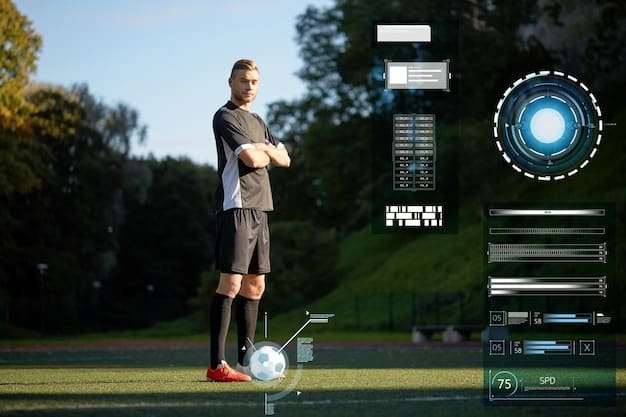Ethical AI in Sports Officiating: Challenges & Considerations

The ethical considerations surrounding the use of artificial intelligence in sports officiating include concerns about fairness, bias, transparency, accountability, and the potential deskilling of human referees, necessitating careful evaluation and regulation.
The integration of artificial intelligence (AI) into sports officiating promises increased accuracy and efficiency, but it also raises significant ethical dilemmas. Understanding what are the ethical considerations surrounding the use of artificial intelligence in sports officiating is crucial for maintaining the integrity of sports and ensuring fair play.
The Promise of AI in Sports Officiating
AI is rapidly transforming various aspects of sports, and officiating is no exception. The potential benefits of AI in this field are immense, including the ability to make more accurate calls, reduce human error, and provide real-time analysis. However, this technological revolution is not without its challenges.
Before delving into the ethical considerations, it is essential to understand the capabilities and limitations of AI in sports officiating. AI systems use a combination of cameras, sensors, and algorithms to track player movements, ball trajectory, and other critical game data, allowing for automated decision-making in real-time.
Enhanced Accuracy and Consistency
One of the primary advantages of AI in sports officiating is the potential for enhanced accuracy. Human referees can sometimes miss crucial details due to fatigue, bias, or limitations in their field of vision. AI systems, on the other hand, can process vast amounts of data and make objective decisions based on predefined rules.
- Real-Time Analysis: AI can provide instant replays and analysis of critical plays, helping referees make informed decisions.
- Reduced Human Error: By automating decision-making, AI can minimize the risk of human error, ensuring greater consistency in officiating.
- Objective Calls: AI systems are programmed to be impartial, eliminating subjective biases that may influence human referees.

Addressing Bias and Fairness
One of the key ethical questions surrounding AI in sports officiating is whether these systems truly offer unbiased objectivity. Algorithms are created by humans and trained on data, and biases in data or programming can translate into biased decision-making by AI. If not carefully designed and implemented, it might perpetuate or amplify existing inequalities within sports.
When considering these ethical concerns, it’s essential to ensure that the data used to train AI systems is diverse and representative of all athletes. Furthermore, it’s critical to regularly audit these systems to identify and rectify any biases that may arise.
Fairness and Bias in AI-Driven Decisions
Fairness is a cornerstone of sports, and any technology that affects the integrity of the game must uphold this principle. AI algorithms used in officiating must be free from biases that could unfairly disadvantage certain players or teams.
Ensuring fairness requires a multifaceted approach, including careful data selection, algorithm design, and ongoing monitoring. Developers must be diligent in identifying and mitigating potential sources of bias to uphold the integrity of sports.
Data Selection and Training
The data used to train AI algorithms plays a crucial role in determining their fairness. If the training data is skewed or incomplete, it can lead to biased decision-making. For example, a system trained primarily on data from male athletes may not perform accurately when applied to female athletes.
- Diverse Datasets: AI systems should be trained on diverse datasets that reflect the demographics of the athletes and teams involved.
- Bias Detection: Techniques for detecting and mitigating biases in training data should be employed to ensure fairness.
- Regular Audits: AI systems should be regularly audited to identify and rectify any biases that may arise over time.
Algorithmic Transparency and Explainability
Another challenge is the lack of transparency in how AI algorithms make decisions. Often, these systems operate as “black boxes,” making it difficult to understand the reasoning behind their calls. This lack of explainability can erode trust in the technology.
Therefore, promoting algorithmic transparency is essential through strategies such as designing AI systems that offer clear explanations of their decision-making processes. For instance, providing referees access to real-time visualizations illustrating how the AI arrived at a specific determination can improve understanding and trust.
Transparency and Explainability
Transparency is essential for building trust in AI systems. When AI makes a call, it should be clear why that decision was made. This requires AI algorithms to be explainable and their decision-making processes to be transparent.
Explainability can take various forms, such as providing referees with real-time visualizations of the data used to make a call or offering post-game analysis that breaks down the reasoning behind each decision. This enhances understanding and promotes accountability.
The Black Box Problem
Many AI algorithms, particularly those based on deep learning, are inherently opaque. These “black box” systems make decisions based on complex patterns in the data, making it difficult to understand their decision-making processes. This lack of transparency can be problematic in high-stakes situations where fairness and accountability are paramount.
- Explainable AI (XAI): Developing explainable AI techniques that can provide insights into the reasoning behind AI decisions is crucial.
- Visualization Tools: Providing referees with visualization tools that illustrate how the AI arrived at a decision can improve understanding and trust.
- Post-Game Analysis: Offering post-game analysis that breaks down the reasoning behind each decision can help athletes, coaches, and fans understand the technology.
Accountability for AI Errors
Another critical ethical aspect is addressing accountability for errors made by AI. In cases where an incorrect AI decision affects the outcome of a game, it is important to have clear guidelines for determining responsibility.
For instance, it should be specified whether accountability rests with the AI developers, the sports federation deploying the technology, or the referees overseeing its use. Establishing robust accountability frameworks is essential to maintaining trust in AI systems. Furthermore, protocols should be in place to handle these instances, such as allowing referees the option to override incorrect AI decisions or implementing mechanisms for reviewing and correcting errors post-game.
Accountability and Oversight
When AI makes an incorrect call, who is responsible? Determining accountability for AI errors is a complex issue that requires careful consideration. Clear guidelines and protocols must be established to address this challenge.
Accountability can be assigned to various stakeholders, including AI developers, sports organizations, or referees. Ultimately, it is essential to have a system in place for reviewing and correcting AI errors to maintain fairness and integrity.

Human Oversight and Intervention
One approach to addressing accountability is to maintain human oversight of AI decisions. Referees can be given the authority to override AI calls if they believe the system is making an error. This ensures that human judgment remains a critical component of officiating.
- Override Authority: Referees should have the authority to override AI calls if they believe the system is making an error.
- Training and Education: Referees should be trained on how to effectively use and interpret AI data.
- Feedback Mechanisms: Systems for providing feedback to AI developers about errors and biases should be established.
It is also vital to offer adequate training and education to referees on how to use and interpret AI data effectively. This empowers them to leverage the technology confidently.
Job Displacement and Deskilling
The rise of AI in sports officiating raises legitimate concerns about job displacement and deskilling. As AI assumes more responsibilities, there is a risk that human referees will lose their jobs or that their skills will atrophy.
However, others assert that AI can augment the capabilities of referees, enabling them to focus on more complex aspects of officiating. Integrating AI tools can help referees focus more on decision-making and strategy, as AI manages basic tasks, potentially enhancing their effectiveness.
The Impact on Human Referees
The use of AI in sports officiating raises concerns about the potential displacement of human referees. As AI systems become more sophisticated, there is a risk that human referees will be replaced by machines. Even if human referees are not entirely replaced, their roles may be diminished.
On the other hand, some argue that AI can augment the capabilities of referees, allowing them to focus on more complex aspects of officiating. Ultimately, the impact of AI on human referees will depend on how the technology is implemented and managed.
Retraining and Upskilling
One way to mitigate the negative impact of AI on human referees is to provide them with retraining and upskilling opportunities. Referees can be trained on how to use AI tools effectively, allowing them to leverage the technology to improve their performance.
- AI Training Programs: Develop training programs to teach referees how to use and interpret AI data.
- Skill Development: Focus on developing the skills that AI cannot replicate, such as communication and judgment.
- Mentorship Programs: Establish mentorship programs to help referees adapt to the changing landscape of sports officiating.
Maintaining the Human Element
Beyond the direct effects on referees, another concern is the erosion of the human element of officiating. Sports are not just about objective accuracy, but also about the nuances of human judgment, empathy, and communication. Replacing human referees entirely with AI systems could lead to a sterile and impersonal sporting experience.
The implementation of AI should respect the athletes and fans and promote a healthy balance between tech and human aspects. AI must complement, not completely substitute, human refs, who can interpret complex situations and connect with players.
| Key Point | Brief Description |
|---|---|
| 🤖 AI Bias | Algorithms can perpetuate inequalities if trained on skewed data. |
| 🔍 Transparency | Lack of transparency in AI decisions can erode trust in the technology. |
| 🎯 Accountability | Clear guidelines needed for AI errors, assigning responsibility. |
| 🧑⚖️ Human Element | Maintaining the nuanced human judgment in sports officiating. |
Frequently Asked Questions (FAQ)
▼
AI can enhance fairness by reducing human error and subjective biases in calls. However, to ensure AI’s impartiality, it must be trained on diverse datasets and undergo regular audits.
▼
Using AI without transparency can lead to distrust due to the “black box” problem, where the reasoning behind decisions is unclear, undermining confidence in the system.
▼
Accountability for AI errors is a complex issue, but should ultimately rest with AI developers and those who oversee the system, with mechanisms for review and correction.
▼
AI’s impact may lead to job displacement or deskilling, yet referees can adapt by retraining and upskilling to use AI tools, improving their overall performance.
▼
To retain the human element, a balance should be struck by integrating AI to complement referees rather than completely substitute them, empowering refs to use their human insight.
Conclusion
The integration of artificial intelligence in sports officiating brings forth a landscape of ethical considerations that demand attention. From ensuring fairness and transparency to addressing accountability and mitigating job displacement, navigating these challenges is essential for maintaining the integrity of sports. By thoughtfully addressing these concerns, we can harness the potential of AI to enhance officiating while upholding the values that make sports meaningful.





